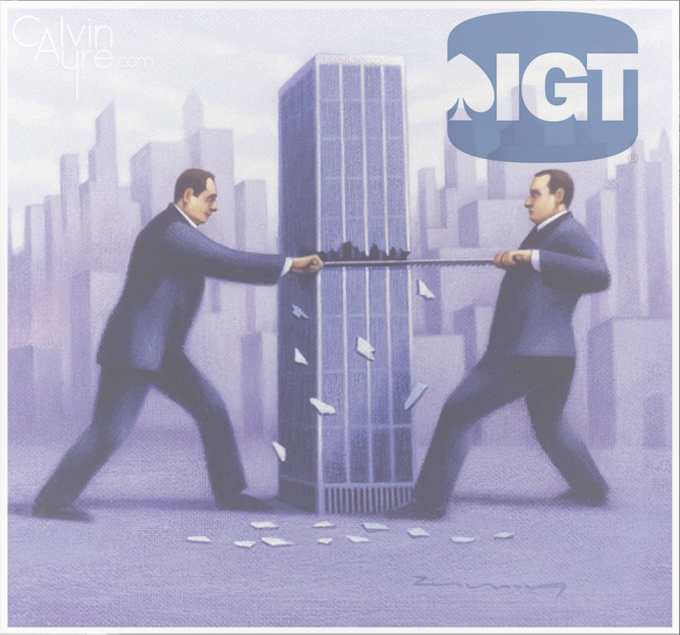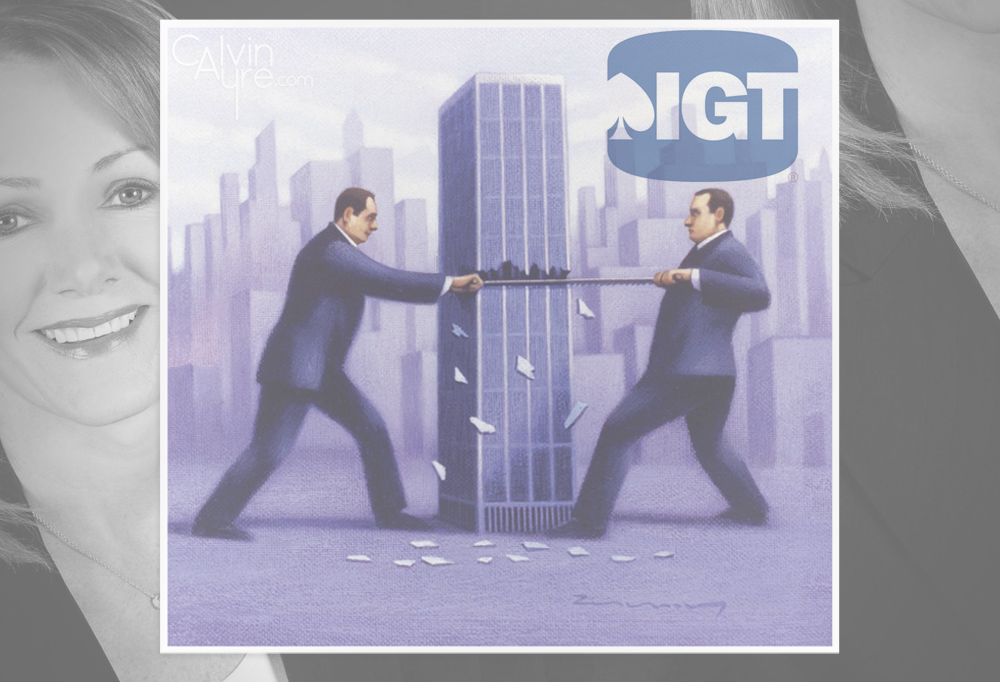Back in October, I wrote a piece here on CalvinAyre.com arguing that Patti Hart, CEO of International Game Technology (IGT), needed to move on. While I have no personal vendetta against Ms. Hart, I noted a series of missteps under her leadership, most notably the nine-figure purchases of Entraction and Double Down Interactive, along with an accelerated $400 million stock buyback executed in June 2012, just weeks before the stock plummeted due to lower-than-expected quarterly earnings.
In comments on the piece, and direct correspondence received after its publishing, it was clear that many employees of and investors in IGT were similarly dissatisfied with Hart’s performance atop the company. Concerns about Hart’s performance finally came home to roost for IGT last week, as shareholder Ader Investment Management (AIM), run by former industry analyst Jason Ader, initiated what is known as a “proxy fight” last week.

In a “proxy fight,” a shareholder – in this case Ader, supported by former IGT Chairman and CEO Charles Mathewson – attempts to remove or replace members of the board of directors, installing new directors who are more sympathetic with the demands of the group – or, at the minimum, less compliant with the strategy of current management. In an SEC filing on January 11th, Ader’s group announced its nominations of three new directors: Mathewson, Raymond Brooks, an expert in distressed companies, and Daniel Silvers, president of Ader’s investment management company and a long-time gaming industry analyst and investor. Originally, Ader had nominated himself for a board position, in an attempt to gain half of the board’s eight seats; after his withdrawal, the group appears to be aiming for solely a minority slate. Under such an arrangement, AIM will not control the company; but its three directors will be able to voice their opinion on IGT strategy – and perhaps, its management.
In its proxy filing, AIM echoed many of the concerns about IGT management that I had raised in October. “The Ader Group seeks to refocus IGT on a business model which it believes led to IGT’s historic success…We believe IGT is deeply undervalued as a result of:
(i) a lack of focus on the core slot machine and systems business…
(ii) a lack of casino gaming industry experience in management ranks, and
(iii) the results of poor capital allocation decisions highlighted by a series of costly non-strategic acquisitions.” The activist group also pointed out that “the company’s stock price, which declined by 16.2 percent in 2012, ‘speaks for itself.’”
In a letter to shareholders, IGT defended its current board of directors, and its recent performance. The company noted that total revenues increased by more than 10% in 2012, while adjusted earnings grew by 12%. IGT expects further earnings growth in 2013, where it projects it will record its “FOURTH consecutive year of double-digit growth in adjusted earnings per share from continuing operations [capitalization in original].” The company also pointed out myriad investments, including $800 million in research and development, $750 million to acquisitions, and $546 million in share repurchases in 2012. In an interview with Bloomberg, CEO Hart said IGT stock was struggling due to “economic headwinds that have not helped us.” She added, “we’re not happy with the stock price either,” but noted “I think the stock price since I joined the company is up significantly.”
 IGT’s response sounds good at first read, but it is somewhat disingenuous, and the company’s defense seems far weaker when analyzed closely. The four years of consecutive double-digit (ie, growth of over ten percent) growth come from the depressed base of 2009, when the gambling industry as a whole seemed on the brink of extinction. In addition, the growth comes solely on an “adjusted” basis; 2012 real earnings actually fell from 2011 earnings. In calculating its adjusted earnings, IGT eliminated a series of charges, notably 20 cents per share from the Double Down acquisition. That purchase was the largest of the “costly non-strategic acquisitions” to which Ader referred in its letter announcing the proxy fight. The fact that adjusted earnings rose shows that the core business is progressing; the fact that actual earnings fell shows the negative impact of the Double Down acquisition. This is precisely the argument that Ader is making in attempting to remove Hart (and possibly other executives); in chasing so-far illusory profits in social and online gaming, IGT has ignored the slot machine business that turned it into a market leader and a multi-billion-dollar company.
IGT’s response sounds good at first read, but it is somewhat disingenuous, and the company’s defense seems far weaker when analyzed closely. The four years of consecutive double-digit (ie, growth of over ten percent) growth come from the depressed base of 2009, when the gambling industry as a whole seemed on the brink of extinction. In addition, the growth comes solely on an “adjusted” basis; 2012 real earnings actually fell from 2011 earnings. In calculating its adjusted earnings, IGT eliminated a series of charges, notably 20 cents per share from the Double Down acquisition. That purchase was the largest of the “costly non-strategic acquisitions” to which Ader referred in its letter announcing the proxy fight. The fact that adjusted earnings rose shows that the core business is progressing; the fact that actual earnings fell shows the negative impact of the Double Down acquisition. This is precisely the argument that Ader is making in attempting to remove Hart (and possibly other executives); in chasing so-far illusory profits in social and online gaming, IGT has ignored the slot machine business that turned it into a market leader and a multi-billion-dollar company.
The focus on investments is curious as well; as it is precisely those investments that have led to the criticism of Hart, from not only Ader, but myself and other analysts. Research and development spending appears reasonable (IGT spent 10% of sales on R&D in fiscal 2012, while competitor Bally Technologies (BYI) spent 11 percent); but the point of R&D is to create new products which grow revenue, ship share, and earnings. The numbers surrounding R&D are far less important than the effect of that spending, which has been relatively modest improvements in revenue and profits.
Meanwhile, the $750 million in acquisitions was clearly poorly spent; though Hart told the Las Vegas Review-Journal last year that the Double Down acquisition “at some point…will be the best investment we ever made,” analysts – and common sense – say otherwise. For most of the winter, the $500 million purchase price of Double Down has been greater than the value placed by the market on Zynga (ZNGA)’s business, whose revenue base is nearly ten times that of Double Down. Hart also bought Entraction for $115 million in May 2011, only to shut the site down sixteen months later. Again, IGT’s defense is proving Ader’s point; the $750 million in acquisitions represent nearly $3 per share of cash spent on purchases that few, if any, shareholders now argue were correct allocations of capital.
Similarly, the share repurchases were made at elevated levels, with $75 million being spent to purchase shares at $15.18 per share (above the current price) and an “accelerated” buyback taking place in June under bizarre circumstances. IGT announced the buyback six weeks before the stock fell 20% after its third quarter earnings report; postponing the decision until earnings could have saved the company tens of millions in repurchase costs. The repurchase ultimately wound up being a success – the average price per share was $13.22, relative to Friday’s close of $14.98 – but it could have been executed far better.
The reason the repurchase program was a success is because IGT’s stock price has rebounded as of late, up 38 percent from lows seen after the third quarter earnings miss. Fourth quarter earnings beat Wall Street expectations, boosting the stock, but some of the uptrend appears to have come from help from the broad market and sector-wide optimism towards the gambling industry. That boost belies Hart’s claim to Bloomberg that the company has been impacted by the economy; as does the fact that rivals Bally and Multimedia Games have been posting record revenue, with both clearly gaining on market leader IGT. Hart’s observation that the share price is up “significantly” is true, as far it goes; IGT has risen 28% since she took over in April 2009. That represents returns of roughly 6 percent annually, which is hardly a stellar performance.
But the return is even worse, given two key facts. First, nearly all of those gains came during Hart’s first month in office, when the broad market was rebounding off its bottom during the 2008-09 financial crisis. Since May 1, 2009, IGT stock is essentially flat. Secondly, under Hart, IGT stock has significantly lagged the broad market (the S&P 500 has risen over 70%); gambling stocks as a whole (up 120 percent); and competitors Bally and MGAM (up 110% and 500%, respectively). As she did on the Q3 conference call – when Hart blithely argued that a disastrous quarter wasn’t really that bad, and told a bald-faced lie in arguing that the company had “very strong revenue growth” – the CEO continues to sound ridiculously out of touch. Nobody is going to accept 28% share price growth over four years in a volatile industry when that industry, as a whole, has seen its market value better than double. And it is ingenuous – at best – to characterize share appreciation that lags any sort of benchmark possible as “significant.”
IGT management did make a series of persuasive arguments in their letter to shareholders; unfortunately for those shareholders, those arguments showed the potential weakness of the directors nominated by Ader. The company noted that Mathewson had left ten years ago, during which time “the industry and technology have changed dramatically.” When he left, he “handpicked” – according to IGT – successor T.J. Matthews, whose reign was far worse than that of current CEO Hart. From 2004-2009, the company noted, revenues fell 15%, market share tumbled, and the company’s market value fell by 70 percent, or some $6.6 billion. In Mathewson’s defense, it was under his time as CEO (from 1993-2003) that IGT become a powerhouse; as the Review-Journal pointed out, he “is credited with spearheading the company’s phenomenal growth in the 1990s.” However, Mathewson is now 84 years old; while he likely has a wealth of wisdom, it is also highly unlikely that he will be able to return to running the company’s day-to-day operations. And, as IGT notes, ten years is a long time in the gambling industry, particularly given the changes seen since Mathewson left the company in 2009, let alone since he gave up the CEO office in 2003.
The company also pointed out the lack of gaming industry experience held by Ader’s other two nominees – which is particularly surprising given the activist group’s accusation that IGT was already suffering from “a lack of casino gambling industry experience in its management ranks.” While that appears to be true – Hart’s lieutenants have largely come from outside the industry – Ader’s nominees seem poorly-equipped to add much industry-specific wisdom. Raymond Brooks is an expert in “distressed” companies; but the term “distressed” applies, on Wall Street, to companies in or near bankruptcy, not a company like IGT that is simply underperforming. Meanwhile, Daniel Silvers has, as IGT pointed out, “no relevant operating or management experience in the gaming industry” (though he is an experienced analyst of gambling stocks and the sector as a whole).
All told, even those investors (or employees) who would like to see a change at the top should not be too optimistic about IGT’s situation. The Review-Journal’s Howard Stutz wrote on Sunday that “industry insiders pegged the odds at 50-50 that the proxy battle will result in a change at the top of IGT, including a revamped board of directors and a new management team.” The problem is that neither option looks particularly appealing. Should Hart and the board survive this year’s battle, IGT shareholders are stuck with management that has proved disappointing, yet still unwilling to admit its underperformance. But the slate of directors posted by Ader’s group shows a clear lack of gaming industry expertise and has not, as of yet, announced a clear vision of its own strategy for the company. It appears right now that IGT shareholders and employees are stuck between the devil they know and the one they don’t. Sadly, they deserve better.






